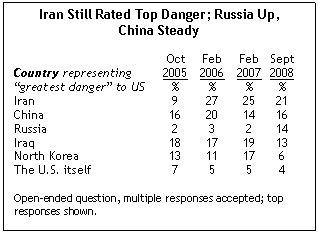Overview

The public is feeling much better about how the war in Iraq is going these days, but at the same time has a sharply diminished appetite for U.S. efforts to deal with an array of global problems. Fewer people than at any point in this decade assign high priority to such foreign policy goals as preventing genocide, strengthening the United Nations, promoting and defending human rights, and reducing the global spread of AIDS and other infectious diseases.
There also is decreased support for an assertive national security policy. Fully 45% say that reducing U.S. overseas military commitments should be a top policy priority, up 10 points since 2004. Notably, even the goal of halting the proliferation of weapons of mass destruction – a widely shared objective for nearly two decades – is now viewed as less important.

A new nationwide survey on foreign policy attitudes by the Pew Research Center for the People & the Press, conducted in collaboration with the Council on Foreign Relations, finds a striking rise in public optimism about the situation in Iraq. Nearly six-in-ten Americans (58%) say the U.S. military effort there is going well, the highest percentage in more than four years. Yet improving perceptions about the situation in Iraq have done little to increase support for maintaining U.S. troops there.
Half of the public views the war as the wrong decision, while the same percentage favors withdrawing U.S. forces from Iraq as soon as possible; these figures have declined only modestly in recent months. By contrast, there is strong public support for maintaining U.S. forces in Afghanistan – a notable exception to the broader trend against global engagement.

The public’s top long-term foreign policy goals are decidedly America-centric. Defending the country against terrorism, protecting U.S. jobs, and weaning the country from imported energy all draw extensive bipartisan support. As in the past, however, there are substantial political disagreements over most other international priorities: about twice as many Democrats as Republicans rate reducing U.S. military commitments as a top priority, and nearly three times as many attach great importance to dealing with global climate change.
John McCain’s consistent advantage over Barack Obama on foreign policy and national security may be limited to some extent by the public’s focus on domestic issues.1 Notably, while swing voters say McCain could best deal with foreign policy by a 52% to 25% margin, they along with most Americans believe that the next president should focus on domestic issues rather than foreign policy. At the beginning of President Bush’s second term, the public by 53% to 27% said it was more important for him to concentrate on domestic policy than foreign policy. That sentiment has swollen to a 60% to 21% margin when citizens are asked about what they want from their next president.
‘Conserve, Baby, Conserve,’ Too

The survey, conducted among 2,982 adults interviewed Sept. 9-14 on landline and cell phones, finds that 76% rate reducing U.S. dependence on foreign energy sources as a top foreign policy priority, up 13 points from July 2004. The public’s willingness to consider policies to achieve that objective appears to be practically open-ended.
Two-thirds of Americans (67%) favor allowing more offshore oil and gas drilling in U.S. waters, yet about the same percentage (69%) supports establishing tax incentives to encourage energy conservation. And even greater percentages continue to support requiring improved vehicle fuel efficiency (88%) and increased funding for research on wind and other alternative technologies (82%).
Support for energy conservation notwithstanding, a growing number of Americans also favor allowing oil and gas drilling in Alaska’s National Wildlife Refuge: 55% currently support drilling in ANWR, up five points since June and 13 points since February. There also is increased public support for promoting the use of nuclear power; 50% now favor wider use of nuclear power, compared with 44% in February.
There are wide partisan differences over many energy options, particularly ANWR drilling, offshore drilling, and increased use of nuclear power. Yet overwhelming percentages of Republicans, Democrats and independents alike support more funding for alternative energy, higher fuel standards, and extending tax incentives to encourage conservation.
The public has low expectations that these policies will provide a quick fix to America’s energy problem. Most of those who believe that offshore drilling and increased funding for alternative energy technologies will reduce U.S. energy dependence say these actions will not affect the nation’s energy supply in the next few years, but instead over the longer term.
Global Threats: Russia on the Rise

More Americans say that Iran represents the greatest danger to the United States than mention any other country. About one-in-five (21%) volunteers Iran as the greatest danger, in an open-ended format; 16% mention China, while 14% cite Russia. The proportion naming Russia has jumped substantially since February 2007 (from 2% to 14%).
While an increasing percentage views Russia as the greatest national danger to the United States, fewer than half (44%) believe that growing tensions between Russia and its neighbors represents a major threat to U.S. well-being. By contrast, 72% say that Islamic groups like al Qaeda are a major threat for the United States.
In addition, relatively few Americans (18%) view Russia as an adversary; far more (48%) say Russia is a serious problem but not an adversary. The public expresses similar views about whether China is an adversary. Roughly half (49%) say that China is a serious problem but not an adversary, while just 19% say it is an adversary.




